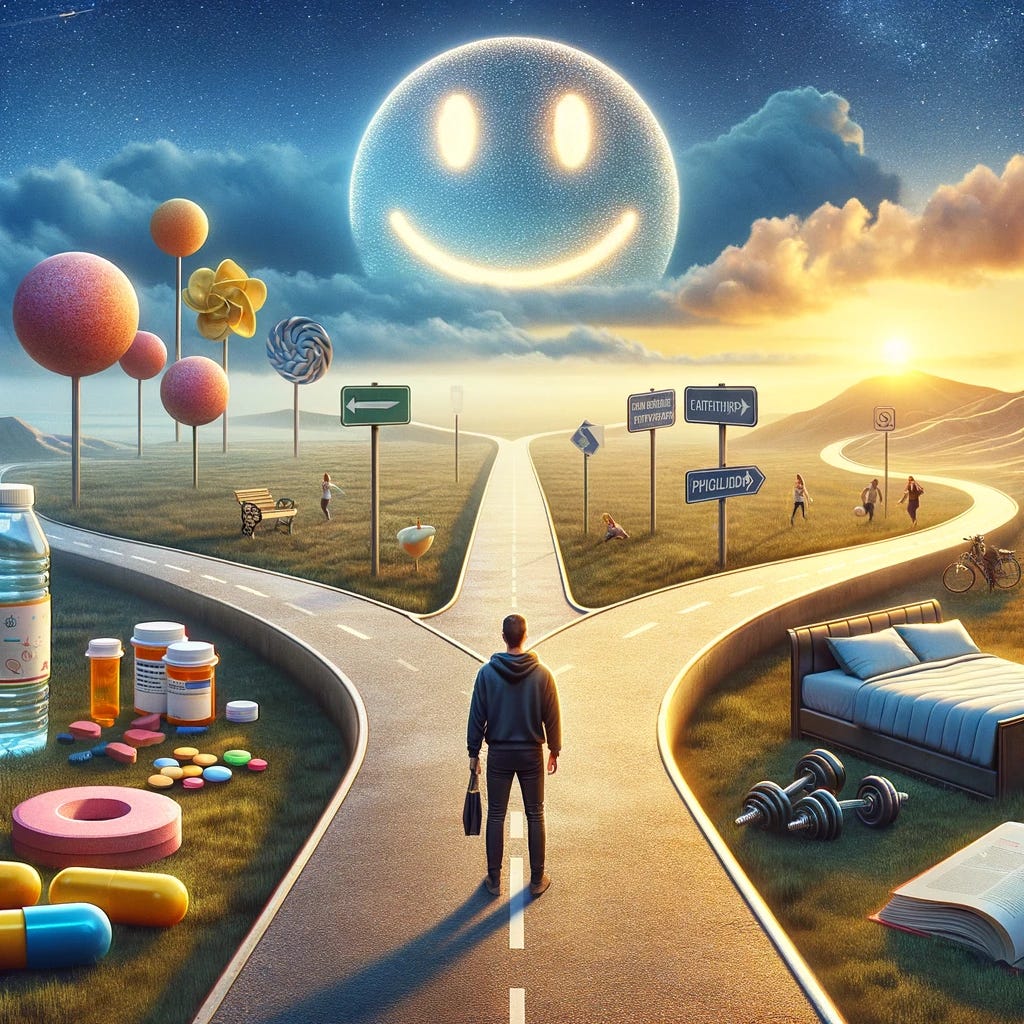How to find happiness in 2024
Reflections on wellbeing, psychology and eudaimonia and hedonism
I was seven when I saw a psychologist for the first time. A week later, I educated my year three classmates on the definition of ‘stress’ for show and tell.
I remember more pain than happiness across the first thirty years of my life. But I looked for happiness everywhere. I didn’t find it in romantic love, or the series of dramatic, adolescent friendships, or even in my anally retentive approach to Christianity.
I called my first published book How to Be Happy, a title that American readers saw little irony in, and were disappointed to find a chronicle of depression among the pages. Americans have a history with happiness anyway.
That special breed of shiny-teeth, big-foreheaded people put the pursuit of happiness into their Declaration of Independence, sending generations into therapy forever more.
Happiness is cultural and historical, of course. And happiness in 1776 meant something very different to now. Happiness was, first of all, the primary property of white men. Late last year, I was in conversation with philosopher AC Grayling, who pointed out historical happiness has very little to do with a ‘smiley-smiley’ feeling. It was about a feeling of being satiated. Your primary needs were met. You were modestly comfortable. But with this was the understanding that life would be annoying, or tragic, or even devastating.
But now there are more people in the middle class. Life isn’t easy for many of us, but a lot of us are fed, watered, and have somewhere safe to sleep at night. Friction is being gradually removed from our lives. We can order our heart’s desire via a credit card on a mobile phone and have it at our doorstep. But more of us are depressed and anxious than ever. And young people generally think the world’s going to explode at any moment.
Unsatisfied with years of therapy and reading self-help books, my wife and I plunged into a Graduate Diploma of Psychology last year. Any sense we had before that moment of some unifying theory of well-being and happiness was shattered. Psychology is an amazing field of study, and we know an enormous amount about people and how they behave.
But no one has a holistic definition of what being mentally ‘well’ actually means.
Contrary to a lot of contemporary pop psychology and the American shiny-teeth brigade, self-esteem has very little to do with happiness. Turns out that people with high self-esteem aren’t necessarily happier than people with low self-esteem. People with low self-esteem can (in some studies) be happier than those with high self-esteem because they’re constantly surprised by how much better life turns out to be than their expectations.
Hoorah for self-loathing, I guess.
If you want to go deep into the weeds of contemporary academic psychology debate, try figuring out what ‘wellbeing’ means. Psychologists don’t aim for happy patients, just ones with a sense of mental well-being.
Two essential (and sometimes contradictory) aspects of well-being are eudaimonia and hedonism. Hedonism is pleasure in the moment. Extreme hedonism is nihilistic - fuck everything, just go for the shortest route to pleasure. Eudaimonia (literally meaning ‘good spirit’) is a deeper pursuit. Short-term discomfort for a longer-term sense of satisfaction: completing a difficult task, investing in long-term relationships, and so on.
We know most human beings require both kinds - both are dimensions of mental well-being. But how much? And when? Depends, depends, depends.
There’s no answer. No concrete solution to the pain of being human, or even a clear definition of what the problem is.
The best answers we have are the most annoying ones.
In the last decade, in particular, psychology studies have become more integrated with physiological health. The things we know that make the biggest impact on satisfaction, well-being, and happiness (in no particular order), are:
Sleep well. Eat nourishing food. Move your body. Form connections with other people. Drink water.
Do those five things, and make them the primary focus of your daily life, and your suffering will diminish.
Apart from that, keep searching. I’ll see you on the path.


I love this.
It's a tricky thing - especially when the world seems to expect us to be a particular brand of happy, or happy if we have certain things or achive certain goals and oh the happiness guilt! - The I have my health, I got a good mark, I am playing with my child - I should be happy - why aren't I - ness of it all.
It's tricky.
And social media makes it annoying (look for the sparkles in your day! the good moments!)
I, with all of my issues and problems am just aiming for calm. And sometimes in those rare moments of calm, where my head shuts up - I find myself smiling.
For now that is enough.
And I need to work on all of the four/five things I need to be happy - all, even the water.